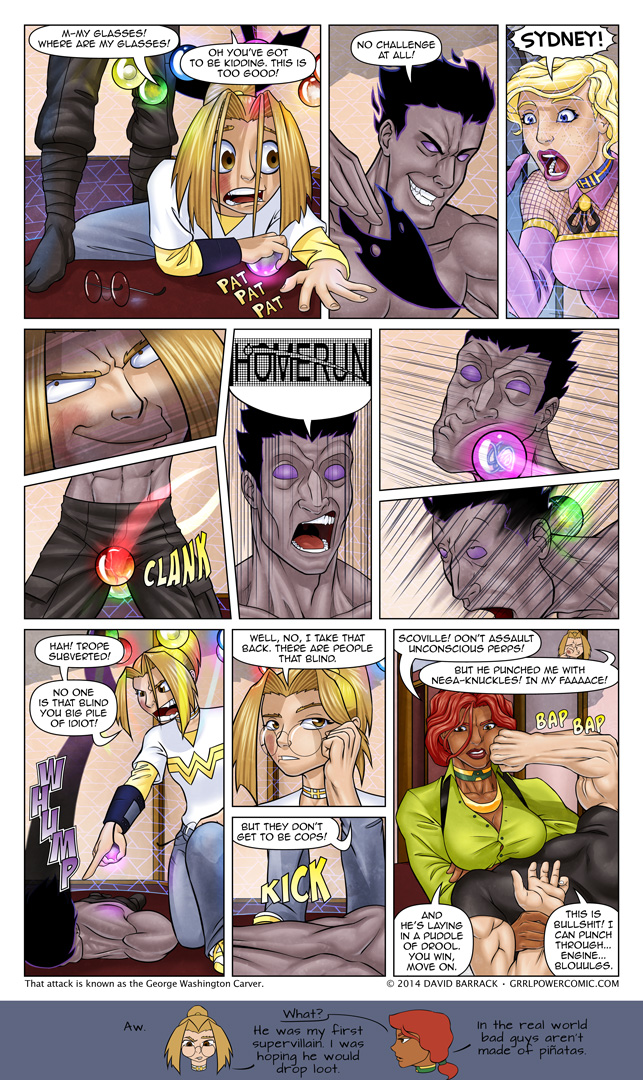|
|
Post by Erika on Jul 4, 2014 22:50:34 GMT -5
SG and many other modern comics are considered ‘genre aware’ or ‘genre-savvy.’ That is, the characters are in a setting that is conscious in some way of the tropes typical for their genre. The aim is generally to spoof the tropes by using them purposefully. What makes these sorts of comics popular? How must creators handle tropes in order to be successful? What makes them fall flat? What are some creative ways in which creators can purposefully subvert tropes?
This is a short answer assignment.
|
|
|
|
Post by Twitch on Jul 28, 2014 16:37:10 GMT -5
Genre-savvy comics are often funny and most everyone like to laugh. However, like all writing, if the author doesn't have a personal 'flair' (art, characters, plot) a genre savvy story will not draw in readers. It all boils down that mysterious blend of creative/technical abilities. While there is some give and take between these two parts of story-telling, a writer of any style needs both. My personal favorite way to subvert tropes is build a character who keeps the audience entertained by switching between tropes/real-life actions. The author of the webcomic, Grrl Power, Dave Barrack, does this perfectly in the Velma Reversal. See here for page's archive.  Grade: 2 scooby snacks Grade: 2 scooby snacks |
|
|
|
Post by rypperd0c on Jul 29, 2014 23:15:11 GMT -5
The 'Genre Aware' story is one that is going to have comic moments, but not necessarily be a farce or spoof of the genre as a whole. Like any other story element, it has to be used in careful measure. Since Twitch used "Grrl Power," I will now reference "Girl Genius." First we see the mad scientists confronting a creation. ((please follow the links and support this comic )) www.girlgeniusonline.com/comic.php?date=20091007In this confrontation, Agatha Heterodine makes a common mad scientist mistake. In the bottom right panel, a pair of "mad boys," as they are known in the comic, even comment on how typical the mistake is (demonstrating genre awareness.) Fortunately, Agatha learns from this encounter, and subverts the trope later on. www.girlgeniusonline.com/comic.php?date=20130710And to carry the joke home, demonstrating that it was Agatha's personal growth that made the difference... www.girlgeniusonline.com/comic.php?date=20130805Grade: Gelatinous Cube |
|
|
|
Post by Kashiro on Sept 1, 2014 6:57:07 GMT -5
Usually, these comics are popular because they subvert or provide a new twist/interpretation of traditional comic storylines/plots. That, and they're usually good comics to begin with. Creators have to handle tropes carefully, as some tropes are literary devices (i.e. Chekov's Gun, Morton's Fork, etc.) while some are character archetypes (Byronic hero, Jungian Hero, Hooker with a Heart of Gold, Jerkass, etc.). The former is incredibly useful and subtle, while the latter is less so, and sometimes is not a good idea. Unfortunately, almost every theoretically possible character can fit into at least two or three tropes, so it's inevitable to use them. Tropes aren't Bad, after all. However, you have to be careful not to be offensive, which is the main concern in this area. What makes a comic fall flat can be various things. One interesting thing to note is that people are drawn to certain comics for certain things, and don't mind if it can't be successful in the mainstream sense since it's enough for what they want. I.e. a comic with horrendous, horrendous art can be forgiven if the readers manage to read enough to fall in love with the story (This happens a lot less often than you'd think, given that most talented writers find a talented artist to work with, and vice versa). Unfortunately, the storyline doesn’t have to be too developed if the artwork is wonderful, as most people won't pick up on the subtle nuances of a masterful piece of writing.
On the matter of creative ways to subvert tropes, one of the easiest (and laziest/most unimaginative) ways is to completely invert the trope. This, however leads to the same problem all over again, as all that happens is the stereotype is the opposite of what it used to be. So, a good way is to do something original. Don't treat characters like walking tropes. Make them three-dimensional. Make them people, easy to empathise with, easy to visualise in real life. And from there, change one thing about them. But justify it. The short person isn't angry because they're short, but rather because they're insecure about their height and have a need to make themselves stand out.
|
|
|
|
Post by Erika on Sept 4, 2014 23:11:00 GMT -5
Napoleon complex. Totes not a trope.  |
|
|
|
Post by Kashiro on Sept 5, 2014 5:59:14 GMT -5
Napoleon complex. Totes not a trope.  Ironically, napoleon wasn't actually short. Wasn't it just a nickname or something that stuck? Once again, Tropes Are Not Bad  |
|